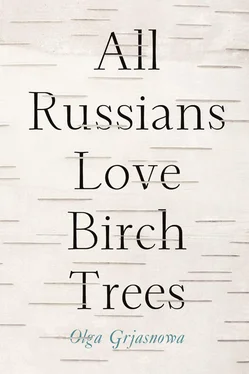“I studied it.”
“Do you speak Hebrew?”
“No.”
“Do you have a boyfriend?”
“Yes. No. I mean no.”
“Is he Arab, Egyptian, or Palestinian?”
“No.”
“What is he then?”
“Dead.”
They looked at each other, irritated.
“When did he pass away?” the young woman asked shyly.
“Recently.”
“I’m sorry.” The female soldier showed the tiniest of sympathetic smiles.
“How did he die?” the male soldier asked.
“Pulmonary embolism.”
“Was he Arab, Egyptian, or Palestinian?”
I was still trying to figure out if he’d really just asked this question when we heard the following announcement: “Do not be alarmed by gunshots. Security needs to blow up suspicious passenger luggage.”
Multiple gunshots followed. The walkie-talkie of the bald guy beeped and he talked into it in a quick, agitated voice. The soldiers closed my suitcase. They apologized for the examination and explained that it had been necessary because of the security situation. They wished me a pleasant stay in the Holy Land. The soldier wanted to talk me into visiting Eilat. He was from there and knew every stone, he said. His colleague interrupted to tell me about little waterfalls all around Jerusalem. She was in the process of writing out the bus connection from the central bus terminal when a concerned officer hurried toward us.
He introduced himself, shook my hand, and apologized politely for having blown up my computer. Then he led me into another room, where its remains had been laid out. My computer hadn’t really been blown up, though: the white case bore three bullet holes. The officer chewed his gum.
“Why did you shoot my computer?” I asked in disbelief.
“We thought it was a bomb. It’s standard procedure with a suspected terrorist attack.” He spoke slowly, as if to a child, having to explain the obvious.
“How am I supposed to work now?”
“The Israeli state will provide you with another computer.”
“When?”
“Soon.”
My cousin arrived about forty minutes later, flung her arms around my neck, and was gorgeous. Right away she informed me that she’d received my call while in bed with her new director, but she didn’t want to miss out on greeting me at the airport. Hannah was my mother’s niece. But we were a widely cast family with unclear degrees of relation and Mother was bad at remembering both names and faces. Therefore everyone who didn’t earn their own money was a niece or nephew. The seniors were uncles and aunts, and the rest were simply cousins. To better tell them apart, my mother secretly assigned them numbers. Hannah was Niece No. 5 and her mother, Cousin No. 13, but she wasn’t a hundred percent sure about that.
I mostly knew my relatives from photos that were sent regularly. The photos of family gatherings were especially sad — my aunts still had crumbling smiles on their faces, but their husbands didn’t bother anymore. They just stared dejectedly at the camera. The table in front of them was set with the dinnerware they’d brought from the USSR. Hannah, on the other hand, was always the noticeably good-looking girl in front of spectacular motifs: the Dead Sea, Jerusalem, the Sea of Galilee, the desert.
I’d never properly gotten to know Hannah. The last time we saw each other was seven years ago, when her parents had visited us in Germany. It had been a short, relaxed visit. Hannah was sixteen, I was twelve, and she never took off her headphones. Her parents rented a car and drove from one Rhine castle and forgotten synagogue to the next. My mother had her mind set on proving that it was possible to live in Germany as a Jew.
Following Elisha’s death, Hannah had started calling me regularly. At night, between ten and eleven, after my mother had left. We both knew to avoid getting too close, or asking any touchy questions or expecting honest answers. We didn’t talk about Elisha’s death or Hannah’s daughter. Hannah talked about Israel, the landscape, and the beach, about hiking trails in the North that she wanted to try out with me and about clubs in Tel Aviv that she promised to show me. She talked with me about normal things that I didn’t think of anymore. Soon I became familiar with her everyday life, the names and stories of her friends, even the units in which they had served.
“Why don’t you make aliyah?” she asked.
“No way,” I said. “I’d be stupid to give up German citizenship.”
“OK, then at least come for a while. You’ll like it.”
Now, a few months later, in the parking lot of Ben Gurion Airport I was hit by a wall of hot and humid air. I felt like I’d arrived in the tropics. Suddenly I was excited to be here. I was looking forward to the work and happy that my life might not be entirely over after all.
Hannah never took her foot off the gas pedal. Behind us blinked the red and yellow lights of the airport.
“This isn’t the way I’d imagined you,” Hannah said and lit a cigarette. “You don’t look like me at all. I thought you would look like me. No, I didn’t think you would, I just hoped you would. I hoped you and I would look a bit alike.”
“We’re just cousins.”
“But you don’t look like it at all.”
“Like what?”
“Jewish.”
“You think?”
Hannah nodded and focused on the street again.
“Not at all?” I asked.
“No.”
I secretly studied myself in the rearview mirror.
“Are you sure?”
“I’m sorry.”
“It’s OK.”
“Are you offended?”
“No.” I laughed, loud and hysterical.
Again and again we stopped to take pictures. Hannah was constantly asking someone to take a photo of the two of us, but despite that, we only needed an hour to cross the old town of Jerusalem. After strolling through the Armenian, Christian, Jewish, and Arab neighborhoods, we got in line to go through a security check. The Wailing Wall itself was divided into two sections: one for women and one for men. Of course, the part for women was much smaller. The heat was stifling, the Shabbat almost over, and the Wailing Wall nearly empty.
A tired-looking woman with sunken, wrinkled cheeks wordlessly handed Hannah and me polyester scarfs to cover our knees and shoulders. Hannah took a prayer book from the shelf at the entrance to the Wailing Wall and single-mindedly approached it. I hesitated and sat in one of the randomly dispersed white plastic chairs. To my left, Orthodox girls were praying, dapper in their best Shabbat dresses. To my right, a young woman in a long gray dress and a wig rocked back and forth in prayer. Her little son was jumping around cheerfully between the chairs, pawing his mother’s butt and babbling. His yarmulke kept falling from his head, but he always put it back on immediately, without having to be told to do so. At the very back a nun stood perfectly still, as if carved from stone. She surveyed the scene from a distance, emotionless. Her features were rather masculine and her face sunburned. Only her eyes sparkled, gleaming with an inward focus.
So here, at the holiest site in Judaism, wrapped in a pink-and-blue polyester scarf, I could have consulted God, could have complained or wailed. For a long time, I contemplated what to write on my piece of paper, but I couldn’t think of anything. I wanted Elisha back, that was all. So I wrote Elisha on the slip, folded it, approached the wall, reached out with my right hand, and recited the kaddish. Every crack was filled with paper, prayers, and wishes in different languages. Spanish, Russian, Hebrew, many of them laminated. When I stuffed my piece of paper into the wall, others fell out and landed in front of my feet. I knelt down and started collecting them. I couldn’t resist a quick glance at their contents. Every slip had an addressee. Dear God, Yahweh, El, Adonai. I asked myself whether the missing address would downgrade my slip. But the idea of addressing God hadn’t even crossed my mind, and if it had, I wouldn’t have known how.
Читать дальше












